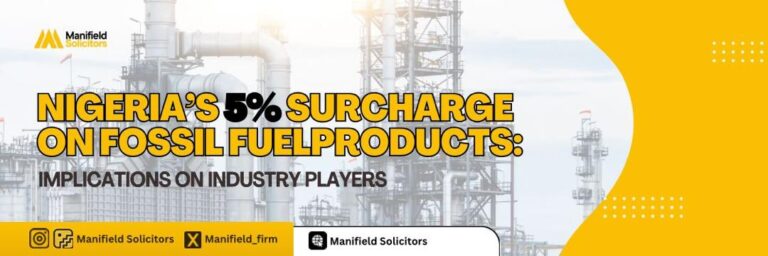Nigeria, with its vast resources and burgeoning market, presents significant opportunities for foreign investors. However, the country’s political landscape, characterized by instability and uncertainty, poses significant risks. Political risk insurance (PRI) has emerged as a vital tool for mitigating these risks and attracting foreign direct investment (FDI).
Understanding Political Risk Insurance
Political Risk Insurance (PRI) offers protection to businesses or investors against financial losses resulting from political events, including expropriation, political violence, currency in-convertibility, and breach of contract by governments. By transferring these risks to insurers, investors can safeguard their investments, making ventures in politically volatile regions more attractive.
Political Risk Insurance in Nigeria is primarily provided by multilateral institutions such as the Multilateral Investment Guarantee Agency (MIGA) of the World Bank and regional institutions like the African Trade & Investment Development Insurance (ATIDI). Additionally, some specialized private insurance companies, both domestic and international, offer PRI products in Nigeria, though their coverage may be more limited. MIGA’s political risk insurance (PRI) protects foreign investors from risks such as:
- Expropriation
- Currency transfer restrictions
- Political violence
- War
- Civil disturbance
- Breach of contract
For example, where a multinational energy company invests in a large-scale solar power project in Northern Nigeria. The company partners with local entities and secures government permits to construct the facility. However, midway through the project, a change in government policy results in the revocation of key permits, citing national security concerns. The investor had secured Political Risk Insurance, which covered expropriation risks. With PRI in place, the company files a claim, and the insurer compensates the investor for the financial losses incurred due to the policy change. This ensures that the company mitigates its financial risks while negotiating a settlement with the Nigerian government, protecting its long-term interests in the country.
MIGA offers coverage for up to 90% of an equity investment and up to 95% of a loan or loan guarantee. However, the exact percentage of coverage will depend on various factors, including the specific risks involved, the country of investment, and the nature of the project.
It is important to note that MIGA does not cover 100% of the investment, and investors are typically required to retain a portion of the risk. Additionally, MIGA has certain eligibility criteria and limitations, thus it is advisable to consult with MIGA directly to determine the specific coverage available for a particular project.
The Impact of PRI on Foreign Direct Investment in Nigeria
Nigeria’s rich natural resources and large market size present substantial opportunities for investors. However, political risks such as terrorism, corruption, and political violence have historically hindered FDI inflows. A study by the Central Bank of Nigeria highlights that terrorism and political violence significantly deter FDI in key sectors like banking and manufacturing.
PRI plays a crucial role in boosting Foreign Direct Investment in Nigeria by:
- Mitigating Risk and Enhancing Investor Confidence: PRI offers a safety net for investors, reducing the perceived risk associated with investing in Nigeria. By transferring risk to insurers, PRI helps to alleviate investor concerns about potential losses. It fosters a more favorable investment climate by signaling the government’s commitment to protecting foreign investments. In other words, PRI provides a safety net against political uncertainties, making Nigeria a more attractive destination for foreign investors. By covering potential losses from political disruptions, investors are more willing to commit capital to Nigerian ventures.
- Facilitating Access to Financing: PRI can improve a company’s creditworthiness, making it easier to secure loans and other forms of financing. Lenders may be more willing to extend credit to companies with PRI coverage, as it reduces their exposure to political risk. Investments backed by PRI are often viewed more favorably by financial institutions, leading to improved access to financing and more favorable loan terms. This is particularly beneficial in capital-intensive sectors like infrastructure and energy.
- Encouraging Long-TermInvestments: With PRI, investors are more inclined to engage in long-term projects, confident that their investments are protected against unforeseen political events. This long-term perspective is essential for sustainable economic development.
Challenges and Considerations
While PRI is a powerful tool, it is not without its limitations. Some challenges include:
- Cost: PRI premiums can be expensive, particularly for high-risk investments.
- Coverage Limitations: PRI policies often have specific exclusions and limitations, such as terrorism or cyberattacks.
- Underwriting Challenges: Insurers may face difficulties in accurately assessing political risks, especially in volatile environments.
- Awareness and Accessibility:Many investors, especially small and medium-sized enterprises, may lack awareness of PRI options or find them inaccessible due to cost or complexity.
- Policy and Regulatory Environment: The effectiveness of PRI is influenced by Nigeria’s regulatory framework. Inconsistent policies and bureaucratic hurdles can undermine the confidence that PRI aims to build.
Conclusion
Political risk insurance is an essential component of any sound investment strategy in Nigeria. By mitigating the impact of political instability and political risks, PRI can help to unlock Nigeria’s vast economic potential and attract significant foreign investment, as it not only protects investors but also contributes to the country’s economic development. As Nigeria continues to evolve and reform, the role of PRI will remain critical in shaping the country’s economic future.
References
- Iyaji, Danjuma (2024) “Insurgency, Political Risk, and Foreign Direct Investment Inflows in Nigeria: A Sectorial Analysis”, CBN Journal of Applied Statistics (JAS): Vol. 12: No. 2, Article 2. Available at: https://dc.cbn.gov.ng/jas/vol12/iss2/2
- Bloomfield Law Practice. (2023). Political Risks in the Nigerian Energy Sector: Analysis and Mitigation Mechanisms. Available at: https://www.bloomfield law.com/sites/default/files/2023-08/blp article political risks in the Nigerian energy sector analysis_and_mitigation_mechanisms.pdf
- Osuma, G., Ayinde, A., Ntokozo, N., & Ehikioya, B. (2024). Evaluating the impact of systemic corruption and political risk on Nigeria’s FDI inflows. Discover Sustainability, 5(432). Available at: https://link.springer.com/article/10.1007/s43621-024-00676-7
- Asiedu, E. (2002). Foreign Direct Investment in Africa: The Role of Natural Resources, Market Size, and Political Instability. World Development, 30(1), 107-118.
- Asiedu, E. (2006). On the Determinants of Foreign Direct Investment to Developing Countries: Is Africa Different? World Development, 34(1), 69-87.
Disclaimer: This newsletter is intended for informational purposes only and does not constitute legal advice. Please consult with legal counsel for advice on specific legal matters.







Add your first comment to this post